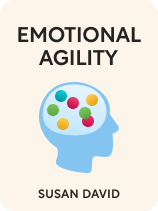

This article is an excerpt from the Shortform book guide to "Emotional Agility" by Susan David. Shortform has the world's best summaries and analyses of books you should be reading.
Like this article? Sign up for a free trial here.
Are your emotions accurately informed? Are you viewing reality through the faulty lens of a false narrative?
Our brains create narratives from sensory inputs to help us understand the world around us. But, sometimes our brains misread sensory information and create false narratives. Clinical psychologist Susan David explains how these narratives mess with our view of reality.
Keep reading to understand how false narratives are created and how they control us.
The Controlling Power of Narratives
Your brain is programmed to take in sensory information and interpret it through narratives explaining how and why the world works. David explains that people instinctively believe these narratives (even false narratives) are true because they’re informed by emotions, which we’re wired to pay attention to. Emotions serve the purpose of creating a physiological reaction in your body in response to external stimuli. You might not need to run from danger, but your brain is still neurochemically wired to react to emotions—and their associated narratives.
(Shortform note: The human brain contains hundreds of millions of pattern-recognizing neurons—in other words, it’s constantly seeking to find meaning in the information it processes. Because it’s so good at this, it’s prone to seeing patterns where there aren’t any—a phenomenon called apophenia. Because apophenia drives us to associate irrelevant pieces of information with one another, it often leads to irrational narratives. For example, if you happen to place badly in two marathons while wearing your favorite blue shirt, you might draw the conclusion that the blue shirt is “bad luck” and caused you to do poorly.)
If you’re walking home at night and consider using a long, unlit street for a shortcut, your brain might draw upon a narrative that dark streets are dangerous. Your brain also gives you sweaty palms and a feeling of dread to encourage you to listen and avoid the shortcut.
(Shortform note: Although human emotions act as a survival mechanism, that same neurochemical system can backfire, allowing your emotions to control you in a physical way. Your brain can’t tell the difference between physical dangers like a charging lion and the abstract “danger” of a looming work deadline—it just perceives a threat and puts you into fight-or-flight mode. This creates physiological responses throughout your body, including the release of stress hormones like cortisol. Consistently high levels of cortisol can disrupt many of your body’s systems, so this “survival mechanism” can actually cause you physical harm.)
False Narratives Don’t Help You
Your brain often makes mistakes when interpreting meaning from sensory information—and, because it relies on these faulty interpretations to form narratives, the narratives it creates don’t always reflect objective reality.
For example, a middle schooler might fail a test because he played video games instead of studying. His parents express disappointment at his priorities—which the student’s brain misinterprets as anger at his failure. He forms the narrative, “If I fail at school, my parents will hate me.” As the student grows older, he views professional life through the old narrative’s lens: “If I fail in my work project, my boss will hate me.” This leads to an unfounded fear of his boss, anxiety over failure, and risk aversion.
(Shortform note: Not only does your brain’s misinterpretation of stimuli affect the narratives that inform your emotions, but research suggests that the reverse may also be true: A negative emotional state can alter—or impair—your visual perception, potentially causing your brain to miss important information when forming a narrative. This can become a feedback loop: Misinterpreted stimuli can alter your perception, and this altered perception causes you to further misinterpret stimuli.)
Narratives deliver information through an internal stream of consciousness that constantly fills your mind with thoughts, associated memories, and emotions. When you reflect on these thoughts, this inner voice also drives you to judge yourself through the lens of your narratives. David says these self-judgments create emotions of inadequacy and frustration.
For example, if you experience a setback at work, your inner voice might whisper that you’ll never succeed—prompting shame and self-loathing. If you instinctively believe and act according to this narrative and these emotions, you might avoid risks that could lead to growth and fulfillment.
(Shortform note: If you’re in the throes of self-judgment, it can be difficult to know if your feelings of inadequacy and frustration are warranted or not. In The Stories We Tell Ourselves, R. Scott Gornto offers a simple technique to see the bigger picture and judge the accuracy of your narratives: After you make a narrative-driven assumption, compare it to the real-life outcome. If your narrative says you’ll never succeed at work, acknowledging your successes proves this to be an irrational narrative you shouldn’t listen to.)

———End of Preview———
Like what you just read? Read the rest of the world's best book summary and analysis of Susan David's "Emotional Agility" at Shortform.
Here's what you'll find in our full Emotional Agility summary:
- Why most people react instinctively rather than objectively
- How to live according to your values to create the life you want
- How to handle your emotions better using mindfulness techniques







Amazing article with such clarity and precision on a complex subject, Elizabeth. Many relationships are disrupted by false narratives. It reminds me of the phrase, Maya (illusion), in Indian philosophy.